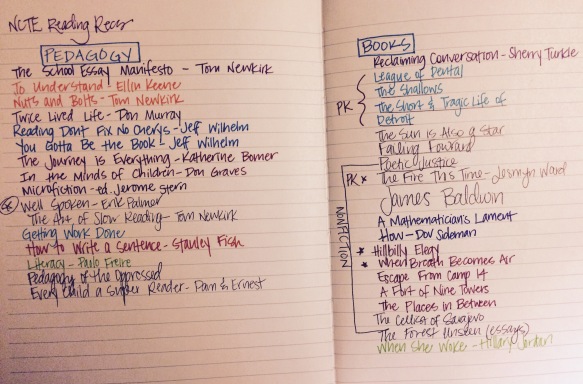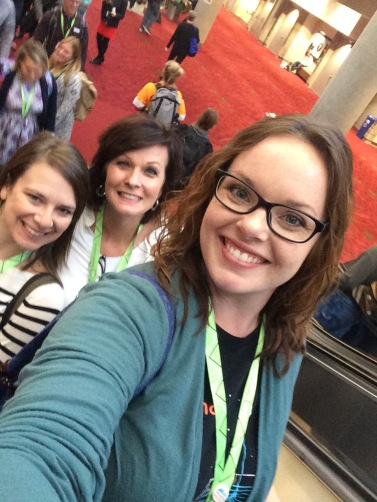Last week, I filled up more pages in my notebook in four days than I did in the last six months combined.
What the heck were you writing about, you ask?
Why, #NCTE16, of course. The annual Mecca of English teachers, where we get to speak, listen, read, and write all about what we’re passionate about: students and learning.
I wrote down amazing ideas.
Pressing questions.
Inspiring quotes.
Endless book recommendations.

I wrote down a lot of beauty and hope and happiness, but I also heard some scary things, and I wrote those down too.
Things like teachers reading To Kill a Mockingbird–OUT LOUD! THE WHOLE THING OUT LOUD!–to their classes over the course of eight weeks.
Things like spending six weeks on a memoir unit only to produce–wait for it–six-word memoirs, and nothing more.
Things like hearing Harvey Daniels questioning whether to let students talk with one another for fear that they’ll be too hard to quiet down.

Aaauuuurrrrrrrggggghhhhhh.
I just read Peter Johnston’s Opening Minds, which centers on the philosophy of getting students into a dynamic frame of thinking–a mindset in which all things are changeable, and that nothing is static. So, maybe I heard some things that troubled me about what’s going on in education in America, but if I think like Johnston wants me to, then I know we’re just not where we need to be…yet.
 I talked with my writing friends about this. Amy, Lisa, and I spent so many lovely hours together squeezing in conversation wherever possible–escalators, restaurants, hotel rooms, Ubers, the NCTE exhibit hall. We thought, talked, wondered, worried, questioned, and quested. We wrote down many pages of ideas for Three Teachers Talk.
I talked with my writing friends about this. Amy, Lisa, and I spent so many lovely hours together squeezing in conversation wherever possible–escalators, restaurants, hotel rooms, Ubers, the NCTE exhibit hall. We thought, talked, wondered, worried, questioned, and quested. We wrote down many pages of ideas for Three Teachers Talk.
In our conversation about those cringe-worthy teaching practices I overheard, we wondered this: why are so many teachers afraid to change? Why are we so glued to the ‘way we do school’ historically? Why, when we brainstorm ideas, do we wonder what can go wrong instead of wondering what can go right?
Change is good, people!
We wondered–to reframe the thinking about what secondary English classrooms look like, what do teachers need?
We examined our own practices to answer this question. We found that we each relied on four things to make decisions about the learning in our classrooms:
- Research-based best practices.
- Examples of other classrooms that look like ours.
- Specific strategies and assignments to try out.
- Conversations with like-minded friends about our ideas.
And we asked ourselves: is Three Teachers Talk answering these questions?
Perhaps, incidentally, we were, but we wanted to be more deliberate. So, we’ve made it our goal to approach those themes more regularly.
On Mondays, we’ll share our responses to the research we read, the quotes we hear from educators, or the ideas we have in our notebooks.
On Tuesdays, we’ll continue to share specific strategies, mini-lessons, and quickwrite ideas we’ve tried out.
On Wednesdays, we’ll converse together in a #3TTworkshop format and share writing from our friends in the form of guest posts to show a variety of perspectives on common ideas.
On Thursdays, we’ll share examples of what’s going on in our classrooms–stories about students, successes, failures.
We hope you’ll find our freshly-framed writing helpful and thought-provoking, just as we found the things we heard at NCTE to be. Please join the conversation in comments, on our Facebook page, on Twitter, or via guest post. We’d love to hear your voice!
Tagged: Readers Writers Workshop

You guys are the best. Instant feedback makes so much sense and that might be what they’re really craving. Thanks again! I can’t wait to plan this all out during winter break!
LikeLiked by 1 person
[…] best buds already shared highlights from their #NCTE16 experiences. Shana calls for change, and Lisa gives thanks and speaks of passion. I am honored to call these educators friends. […]
LikeLike
[…] Three Teachers Talk plans to focus their blogging on the four key elements teachers need to make decisions about learning in their classrooms. (I’m also feeling demoralized about that 8-week readaloud of To Kill a […]
LikeLiked by 1 person
I agree with every word and love the intentionality of 3TT! Keep planting and maybe the “shift harvest” will happen!
LikeLiked by 2 people
Thanks, Terri! I love your harvest metaphor. I think I’ll keep it in mind as I write over the next few weeks! 🙂
LikeLike
Oh, and what’s the name of your facebook group?
LikeLike
Facebook group is Three Teachers Talk. Please join the conversation: https://www.facebook.com/threeteacherstalk/
LikeLike
Ooh, I’m so excited about the new format and the twitter chat. What time will that be? I’m so ready to try workshop, hopefully with the new semester. I will have regular junior English classes, and I’m just wondering how I can motivate them to write in their journals, if I don’t take them up every day. They seem to need the almost instant accountability in order to do much, but then again, I haven’t tried workshop so maybe it will be different. I’ve searched around your blog some and reviewed the grading process. I’ve looked to see if you have a post that directly addresses this. What do you do with a kid that won’t write?
LikeLike
Just jump in! When you give students thought-provoking ideas to respond to in their notebooks and let them know that this is low-stakes writing, they will write. I tell my students: Just write what you think. Do you agree, disagree? What does this remind you of? Then, I give them time to write their thinking. Often, I have them read what they write to one another in pairs or small groups. I wander and listen in. This is usually accountability enough. Occasionally, I have students mark a place they want me to read. I do and leave brief notes of feedback.
For kids that won’t write? They just need to grow in confidence that whatever they think matters. They will eventually write as long as the stimulus is thought provoking enough.
LikeLike
That totally makes sense. I love the idea of reading aloud to each other as well. It’s always good to have as much talking as possible. Thanks so much for the feedback.
LikeLiked by 1 person
I agree with Amy–leap in, the sooner the better, to workshop. It’s the most authentic, common-sense literacy practice I know, and when it’s in place, kids will write, and kids will read. I find that kids will write not so much for instant accountability but perhaps more for instant feedback. We have lots of posts on quick peer feedback–Amy’s on silent sticky conferences and mine on post-it blessings from peers. That might help you create a community of writers quickly, and then get kids jumping into topics that are interesting. I often find interesting topics for writing just incidentally–a YouTube video I find on facebook, or an article I see on Twitter, or a spoken word poem I see on Tumblr, or a commentary I hear on NPR. Whatever strikes me and gets me thinking will get my kids thinking.
Best of luck and email us or comment in the facebook group if we can help!
LikeLike
I love us (on repeat).
LikeLiked by 2 people
My favorite quote from you at NCTE!!!! 🙂
LikeLike